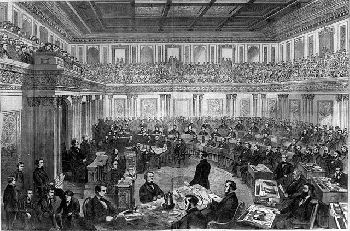
Andrew Johnson impeachment trial
(Image by (From Wikimedia) Theodore Russel Davis (1840–1894) / Illustration in en:Harper's Weekly, April 11, 1868., Author: See Source) Details Source DMCA
As US president Donald Trump returned to the White House after a 12-day trip to Asia, he might be forgiven for wishing he'd spent more time seeing the sights of the Far East. Back home he faces a Republican Party torn by scandalous allegations against its candidate for US Senate from Alabama, a likely bruising fight over tax "reform," and more of the constant nipping at his heels by "Russiagate" special counsel Robert Mueller.
Oh, and Articles of Impeachment introduced in the US House of Representatives on November 15 by several Democrats.
The charges: Obstruction of justice, violation of the Constitution's "domestic emoluments" and "foreign emoluments" clauses, abuse of power (by "undermining the independence of the federal judiciary and the rule of law"), and undermining the freedom of the press.
Whether or not he's guilty of one or more of those things will be decided by the US Senate as jury (a vote of 2/3 is required to convict; the president's party holds a slim majority in that body), in a trial with the Chief Justice of the US Supreme Court presiding.
Or, rather, it will be decided that way in the unlikely event that a simple majority of the House (the president's party holds a less slim majority there) actually votes to impeach him.
If past performance is an indicator of future results, then -- political theater -- is really all we can expect here.
Two past presidents -- Andrew Johnson and Bill Clinton -- have been impeached. Neither was convicted. A third, Richard Nixon, might have been, but he resigned before the House could vote on impeachment.
Johnson was impeached on -- and acquitted of -- ten counts relating to his dismissal of a cabinet official without the Senate's blessing and one count of making speeches that Congress found disrespectful, but one suspects his chief sin was being a Democratic vice-president when a Republican president was assassinated.
Clinton was impeached on -- and acquitted of -- two counts (perjury and obstruction) of which he was clearly guilty, relating to his affair with White House intern Monica Lewinsky, but again his real offense was political: He was a Democrat who'd won re-election against a Republican.
As much as one might like to think of the presidency and Congress as temples to civic virtue or arenas in which issues of great weight are disputed, Washington is in truth a lot more like a "professional wrestling" ring. It's two gangs of boastful peacocks putting on a tag-team show. Washington's rivalries may be more real but they're no more momentous.
I'm hard put to think of a president who never took actions meriting impeachment. But impeachment isn't about facts or evidence. It's about political party. Which means that, for now anyway, Trump's presidency is safe.




